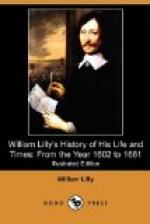Leven the Scot asked the way to Tweed: the honour of that day’s fight was given to Manchester, Sir Thomas Fairfax’s brigade of horse, and Oliver Cromwell’s iron sides; for Cromwell’s horse, in those times, usually wore head-pieces, back and breast-plates of iron. After this victory Cromwell became gracious with the House of Commons, especially the Zealots, or Presbyterians, with whom at that time he especially joined; the name Independent, at that time, viz. 1644, being not so much spoken of.
There was some animosity at or before the fight, betwixt the Earl of Newcastle and Prince Rupert; for Newcastle being General of his Majesty’s forces in the North, a person of valour, and well esteemed in those parts, took it not well to have a competitor in his concernments; for if the victory should fall on his Majesty’s side, Prince Rupert’s forces would attribute it unto their own General, viz. Rupert, and give him the glory thereof: but that it happened, Prince Rupert, in that day’s fight, engaged the Parliament’s forces too soon, and before the Earl of Newcastle could well come out of York with his army; by reason whereof, though Rupert had absolutely routed the Scots and the Lord Fairfax’s forces; yet ere timely assistance could second his army, Sir Thomas Fairfax and Cromwell had put him to flight, and not long after all Newcastle’s army. A most memorable action happened on that day. There was one entire regiment of foot belonging to Newcastle, called the Lambs, because they were all new cloathed in white woollen cloth, two or three days before the fight. This sole regiment, after the day was lost, having got into a small parcel of ground ditched in, and not of easy access of horse, would take no quarter; and by mere valour, for one whole hour, kept the troops of horse from entering amongst them at near push of pike: when the horse did enter, they would have no quarter, but fought it out till there was not thirty of them living; those whose hap it was to be beaten down upon the ground as the troopers came near them, though they could not rise for their wounds, yet were so desperate as to get either a pike or sword, or piece of them, and to gore the troopers’ horses as they came over them, or passed by them. Captain Camby, then a trooper under Cromwell, and an actor, who was the third or fourth man that entered amongst them, protested, he never in all the fights he was in, met with such resolute brave fellows, or whom he pitied so much, and said, ‘he saved two or three against their wills.’




